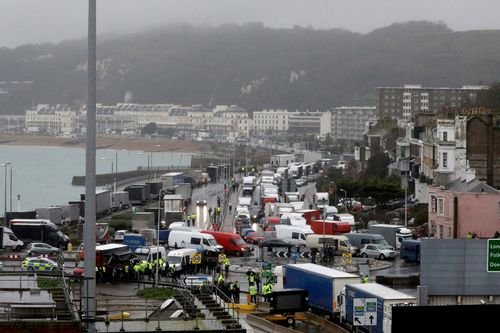Lufthansa airlifts fresh food to England as UK border chaos continues

Germany’s Lufthansa operated a special cargo flight to airlift fruit and vegetables to England on Wednesday as shortages of food and other vital supplies loom because of continuing chaos at the UK-French border.
A Lufthansa spokesperson told CNN Business that the Boeing 777 freighter was carrying 80 tons of perishable goods from Frankfurt to Doncaster-Sheffield airport in northern England. The airline said it was working with a freight forwarder to supply food from Egypt and elsewhere to supermarkets such as Tesco, Sainsbury’s and Aldi.
The move comes as the UK supermarket chains and other businesses struggle to cope with the impact of Sunday’s closure of vital freight arteries between southern England and France, triggered by the British government’s warning that a new, more infectious variant of Covid-19 was out of control in London and the surrounding areas.
France and the United Kingdom agreed late Tuesday to reopen ferry ports and the Eurotunnel rail link, but at least 3,000 trucks remained stranded Wednesday morning with their drivers waiting for the negative Covid-19 tests they need to travel. Just two trucks had arrived in Calais from the English port of Dover, a spokesperson for the Calais Port told CNN. The French National Road Haulage Federation said nothing was moving in Dover.
Leading UK supermarkets Tesco and Sainsbury’s warned earlier this week that they would begin to run out of some fresh items such as lettuce, salad leaves, broccoli, cauliflower and citrus fruits within days if the port chaos wasn’t resolved soon. The industry association responsible for cold distribution also warned that an extended blockade would cause “significant problems” for supply chains in January.
A Tesco spokesperson told CNN Business Wednesday the company had nothing to add to its previous statement.
The backlog of trucks building up around Dover will take days to clear, a UK government minister said Wednesday.
“I hope HGVs [Heavy Goods Vehicles] will be crossing the Channel this morning, and so the position will start to gradually improve, but I think it will take time,” UK Housing Secretary Robert Jenrick said. Speaking to Sky News, he said he does not dispute that delays have caused issues for the supply chain, but asserted that there is “no material shortage of food.”
Running out of fresh goods
The British Retail Consortium, which represents over 170 major UK retailers plus thousands of smaller businesses, said it was “essential” that trucks started moving again quickly now the border had reopened
“Until the backlog is cleared and supply chains return to normal, we anticipate issues with the availability of some fresh goods,” said Andrew Opie, director of food and sustainability at the BRC.
The Food and Drink Federation, which represents manufacturers, said it could take until the new year for the problems to be resolved. “That means we are likely to see, locally, reduced on-shelf availability of some fresh vegetables and fruits, beginning next week. We will also see potential significant disruption to the flow of ingredients into the UK,” said Ian Wright, the federation’s chief executive.
The freight crunch comes at the worst moment for retail businesses as they try to meet peak holiday demand and build additional stocks in case Britain crashes out of the EU single market and customs’ union within days without a post-Brexit trade deal in place.
Other manufacturers have also been hit. Toyota shut its plants in the UK and France early for the holidays. Honda was forced to close a UK plant for three days earlier this month due to logistics snarl-ups.
Lufthansa said it was examining whether additional special cargo flights could be offered during the next few days.
“We are also checking if a regular flight might be possible,” the spokesperson said. “This could be with a freighter, but we are also examining if we could use passenger aircraft for freight flights only.”
The German flag carrier took a similar step at the start of the pandemic back in March when it launched “an airlift for all of Germany” to ensure goods were supplied across the country. The move evoked the Cold War operation by American and British planes to keep West Berlin supplied with food and other essentials during a Soviet blockade in 1948 and 1949.
— Rob North, Sharon Braithwaite and Fanny Bobille contributed to this article.